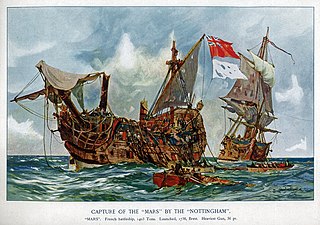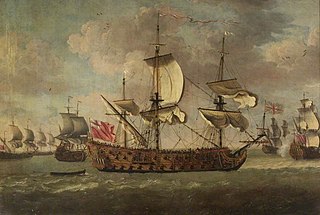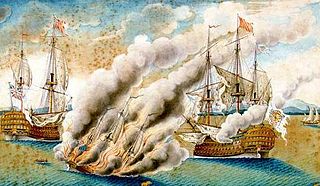
HMS Nottingham was a 60-gun fourth-rate ship of the line of the Royal Navy, built at Deptford Dockyard and launched on 10 June 1703. She was the first ship to bear the name.

HMS Charles was a 96-gun first-rate ship of the line of the Royal Navy, built by Christopher Pett at Deptford Dockyard until his death in March 1668, then completed by Jonas Shish after being launched in the same month. Her name was formally Charles the Second, but she was known simply as Charles, particularly after 1673 when the contemporary Royal Charles was launched.

HMS Falkland was a 50-gun fourth-rate ship of the line of the Royal Navy, built by Holland of New Castle, New Hampshire, and purchased by the navy in 1696.

HMS Swiftsure was a 70-gun third-rate ship of the line of the Royal Navy, built by Sir Anthony Deane at Harwich, and launched in 1673. By 1685 she had been reduced to a 66-gun ship.

President was a 38-gun fourth rate frigate of the Royal Navy, originally built for the navy of the Commonwealth of England by Peter Pett I at Deptford Dockyard, and launched in 1650.

HMS Boyne was an 80-gun third-rate ship of the line of the Royal Navy, launched at Deptford Dockyard on 21 May 1692.

HMS Russell was an 80-gun third rate ship of the line of the Royal Navy, launched at Portsmouth Dockyard on 3 June 1692.

HMS Humber was an 80-gun third rate ship of the line of the Royal Navy, launched at Hull on 30 March 1693.
HMS Torbay was an 80-gun third rate ship of the line of the Royal Navy, launched at Deptford Dockyard on 16 December 1693. In 1707, she served as flagship of Rear-Admiral of the Blue Sir John Norris and belonged to Admiral Sir Cloudesley Shovell's fleet. She saw action during the unsuccessful Battle of Toulon and was present during the great naval disaster off the Isles of Scilly when Shovell and four of his ships were lost, claiming the lives of nearly 2,000 sailors. Torbay suffered little to no damage and finally managed to reach Portsmouth.

HMS Canterbury was a 60-gun fourth-rate ship of the line of the Royal Navy, launched at Deptford on 18 December 1693.

HMS Windsor was a 60-gun fourth rate ship of the line of the Royal Navy, launched at Deptford on 31 October 1695.

HMS Orford was a 70-gun third-rate ship of the line of the Royal Navy, launched at Deptford in 1698. She carried twenty-two 24-pounder guns and four (18-pounder) culverins on the lower deck; twenty-six 12-pounder guns on the upper deck; fourteen (5-pounder) sakers on the quarterdeck and forecastle; and four 3-pounder guns on the poop or roundhouse.

HMS Barfleur was a 90-gun second rate ship of the line of the Royal Navy, launched at Deptford Dockyard on 10 August 1697.

HMS Namur was a 90-gun second rate ship of the line of the Royal Navy, launched at Woolwich Dockyard in 1697.
HMS Panther was a 50-gun fourth rate ship of the line of the Royal Navy, built at Deptford Dockyard and launched on 15 March 1703.

HMS Colchester was a 50-gun fourth-rate ship of the line of the Royal Navy, built by Joseph Allin the elder at Deptford Dockyard and launched on 13 February 1707.

HMS Cumberland was a three-deck 80-gun third rate ship of the line of the Royal Navy, built by Joseph Allin the elder at Deptford Dockyard and launched on 27 December 1710. Her design corresponded to that laid down by the 1706 Establishment of dimensions for 80-gun ships.

HMS Rippon was a 60-gun fourth rate ship of the line of the Royal Navy, built by Joseph Allin the elder at Deptford Dockyard and launched on 23 August 1712.

HMS Deptford was a 60-gun fourth rate ship of the line of the Royal Navy, built to the dimensions of the 1719 Establishment at Deptford Dockyard, and launched on 22 August 1732.

HMS Chester was a 50-gun fourth rate ship of the line of the Royal Navy, built at Deptford to the dimensions laid down in the 1741 proposals of the 1719 Establishment, and launched on 18 February 1743.















